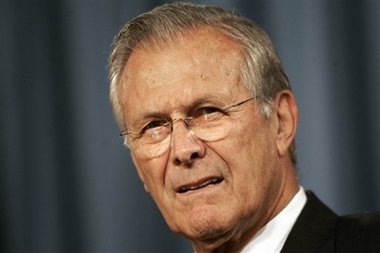WASHINGTON - The Pentagon is trying to convince lawmakers that the war in
Iraq is not breaking the Army and that extending the tours of some troops is
necessary to quell increasing violence in the region.
Defense Secretary Donald H. Rumsfeld and top military officers are to testify
Thursday before Congress, already bitterly divided over the war. In addition,
fresh reports have said that up to two-thirds of the Army's combat units are
unprepared for wartime missions because of the strain of operations in Iraq.
|

Defense Secretary
Donald H. Rumsfeld listens to questions during a press briefing at the
Pentagon, Wednesday, Aug. 2, 2006. [AP]
|
Rumsfeld said Wednesday he essentially was too busy to testify before the
Senate Armed Services Committee and would instead attend a private briefing with
the entire Senate on Thursday. He changed his mind after hours of criticism and
pressure from Senate Democrats, including Sen.
Hillary Rodham Clinton of
New York, who said the Pentagon chief should be accountable to the public by
answering questions on the war.
The Pentagon offered no reason for Rumsfeld's change of plans. Earlier, it
had said the defense secretary has made an aggressive effort to meet with
lawmakers regularly, including testimony at an appropriations hearing earlier
this year and at other classified briefings.
Rumsfeld's relations with Congress have been testy at times and he
occasionally has resisted testifying publicly on contentious subjects, including
the debate over whether high-level officials should be held accountable for the
Abu Ghraib prisoner abuse scandal.
The Pentagon this week announced its decision to extend the tours of an
Alaskan Army brigade to bolster security around a volatile Baghdad and push
troop levels to roughly 135,000 - dashing the Bush administration's hopes
of dropping the figure by tens of thousands by the fall congressional campaigns.
Yet Iraq's president, Jalal Talabani, said Thursday in Baghdad that his
government is "highly optimistic that we will terminate terrorism this year. The
Iraqi forces will take over security in all Iraqi provinces by the end of this
year gradually, and if God's will, we will take the lead." After the comments,
his staff sought to explain that Talabani was referring to the beginning of a
"process" for Iraqis to assume control, not the final step.
Democrats in Washington have highlighted the Army readiness issue as an
example of the administration's mishandling of the war. They urged the president
this week to begin by the end of the year pulling troops out of Iraq.
Bush consistently has said there will be no such pullout until the fledgling
Iraqi government can secure its position and Iraq's security forces can defend
the country. Republicans have backed their GOP president on the issue, but have
acknowledged their frustration with the length of the war and the delayed
homecomings.
"That's a very difficult thing for us," said Sen. Ted Stevens, R-Alaska, of
the Pentagon's decision to keep in Iraq some 3,500 members of the 172nd Stryker
Brigade Combat Team, based at Fort Wainwright in Alaska.
In a letter to Bush released Monday, Democratic leaders in the House and
Senate said they believed the war was overtaxing the military and failing to
calm the sectarian violence.